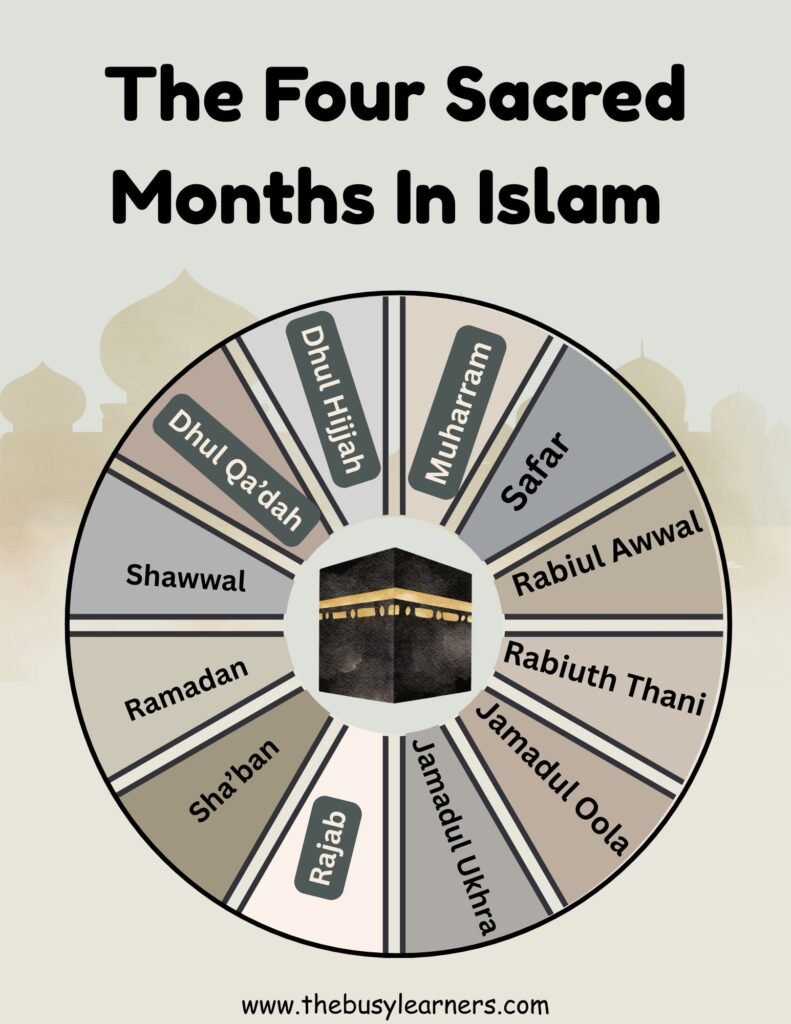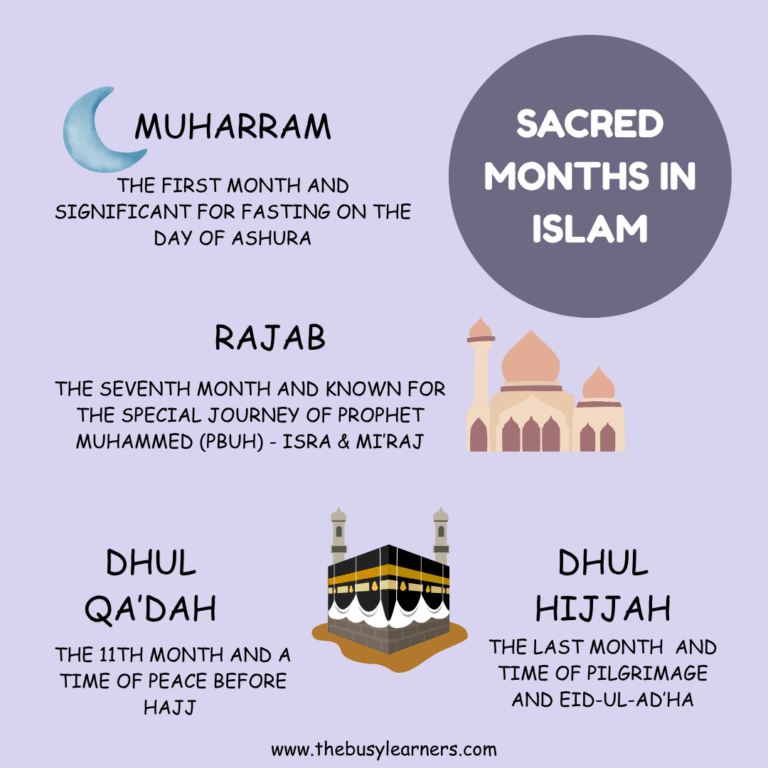
In Islam, four months are considered especially sacred: Muharram, Rajab, Dhul-Qa’dah, and Dhul-Hijjah. These months hold a special place in the hearts of Muslims, offering a time for reflection, worship, and increased devotion. Let’s dive into these sacred months and explore the Quranic verses and Hadiths related to them, as well as the impact these months can have on our daily lives.
Thank you for reading this post, don't forget to subscribe!Sacred Months Series for Kids
Learn about Muharram, Rajab, Dhul Qa'dah and Dhul Hijjah through fun activities and Stories!
Thank you for Joining!
We're so excited to have you on this journey. Check your first activity, In Shaa Allah.
1. Muharram: The First Month of the Islamic Calendar
Muharram is the first month of the Islamic lunar calendar and one of the four sacred months. Among the significant events in Muharram is the Day of Ashura, which falls on the 10th of Muharram. It is a day of fasting for many Muslims, commemorating the rescue of Prophet Musa (AS) and the drowning of Pharaoh’s army.
Quranic Verse:
“Indeed, the number of months with Allah is twelve months (in a year), in the Book of Allah (the Book of Decrees) from the day when He created the heavens and the earth; of these, four are sacred. That is the correct religion, so do not wrong yourselves during them…” (Surah At-Tawbah, 9:36)
Hadith on the Importance of Fasting in Muharram:
“The best fast after the month of Ramadan is the fast of Muharram, and the best prayer after the obligatory prayers is the night prayer.” (Sahih Muslim, 1163)
Fasting in Muharram is highly recommended, especially on the Day of Ashura, as it brings great rewards.
2. Rajab: A Month of Reverence
Rajab is the seventh month of the Islamic calendar, and it holds significant spiritual meaning, particularly because of the event of Isra and Mi’raj, the miraculous night journey and ascension of Prophet Muhammad (SAW).
Quranic Verse:
“Glory be to the One who took His servant on a journey by night from the Sacred Mosque to the Farthest Mosque, whose surroundings We have blessed, to show him some of Our signs. Indeed, He is the Hearing, the Seeing.” (Surah Al-Isra, 17:1)
This verse refers to the event of Isra and Mi’raj, which took place in the month of Rajab.
3. Dhul-Qa’dah: A Time for Peace
Dhul-Qa’dah, the 11th month of the Islamic calendar, is considered a time of peace. It precedes the month of Dhul-Hijjah, when the pilgrimage (Hajj) takes place. It is a time for reflection, tranquility, and spiritual preparation for the sacred days ahead.
4. Dhul-Hijjah: The Month of Hajj and Sacrifice
Dhul-Hijjah is the 12th and final month of the Islamic calendar. It is the month of Hajj, one of the five pillars of Islam, and the month of Eid al-Adha, where Muslims commemorate Prophet Ibrahim’s (AS) willingness to sacrifice his son in obedience to Allah.
Quranic Verse:
“And proclaim to the people the Hajj. They will come to you on foot and on every lean camel, coming from every distant pass…” (Surah Al-Hajj, 22:28)
This verse underscores the significance of the Hajj pilgrimage, a central event during Dhul-Hijjah.
Hadith on Dhul-Hijjah:
“There are no days in which righteous deeds are more beloved to Allah than these ten days (of Dhul-Hijjah).” (Sahih Bukhari, 969)
The first ten days of Dhul-Hijjah are considered particularly virtuous for worship, prayer, and good deeds.
Impact of the Sacred Months on Our Lives
The sacred months serve as a reminder for Muslims to focus on spiritual growth, peace, and reflection. Each month offers unique opportunities to increase our acts of worship, seek forgiveness, and draw closer to Allah. Here’s how these months can impact our daily lives:
1. Spiritual Reflection and Growth:
These sacred months provide us with a time to reflect on our relationship with Allah. Whether it’s through fasting in Muharram, offering extra prayers in Rajab, preparing for the Hajj pilgrimage in Dhul-Qa’dah, or making sacrifices in Dhul-Hijjah, these months encourage us to grow spiritually. By engaging in these acts of worship, we strengthen our faith and our connection with the Creator.
2. Time for Peace and Self-Control:
During these months, Muslims are encouraged to maintain peace and avoid conflicts. The sacred months remind us to practice self-control, avoid arguments, and refrain from unnecessary disputes. This peaceful mindset can significantly improve our relationships with others, fostering a sense of harmony and unity.
3. Opportunity for Increased Worship and Charity:
The sacred months are an opportunity to increase our worship through acts like fasting, praying extra nafl prayers, and giving charity. By taking advantage of these months, we can purify our hearts, seek Allah’s forgiveness, and earn immense rewards. The rewards for good deeds during these months are magnified, making them a valuable time for self-improvement.
4. Strengthening the Ummah:
The sacred months also provide a chance to strengthen the bond with fellow Muslims. By reflecting on the lessons from the lives of Prophets like Ibrahim (AS) and Musa (AS), we can deepen our sense of unity and shared purpose. Whether through communal prayers or charitable acts, these months encourage us to support one another and build a stronger, more compassionate community.
5. A Time for Gratitude and Humility:
The sacred months remind us of Allah’s mercy and the countless blessings He has bestowed upon us. By observing these months with reverence, we cultivate gratitude for the opportunities we have to worship and grow closer to Him. We are reminded of the importance of humility, sacrifice, and devotion in our daily lives.
The four sacred months—Muharram, Rajab, Dhul-Qa’dah, and Dhul-Hijjah—offer us an invaluable opportunity to renew our commitment to faith, seek Allah’s forgiveness, and engage in acts of worship and charity. Whether fasting, praying, reflecting, or engaging in peaceful conduct, these months help us grow spiritually and lead us toward a deeper connection with Allah. Through the teachings of the Quran and Hadith, we are reminded of the importance of these months and encouraged to honor them with devotion and gratitude. May we make the most of these blessed times, striving for peace, reflection, and growth in our faith.
📥 Want to read later?
Click the button to download the FREE PDF version of “Time Made Sacred: What Every Muslim Should Know About the Four Blessed Months“


Comments are closed.